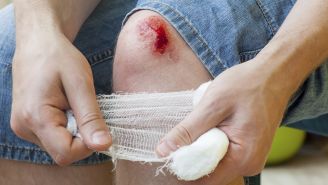Superbug Hot Spots
MRSA is now infecting people in places you'd never suspect.

You’ve probably heard of MRSA (methicillin-resistant Staphylococcus aureus)—a type of staph bacteria that’s resistant to methicillin and other antibiotics once used to treat it. While MRSA used to spread mainly among sick patients in hospitals and other healthcare facilities, the scary news is that this superbug is spreading into communities. Discover five surprising places it can lurk.

Day Care Centers
It’s no secret that day care centers are hotbeds of germs. And MRSA bugs are quite comfortable hanging out by the Legos.
How it can spread: If a child has an open wound (yep, Band Aids fall off), he can contract MRSA if the staph bug enters the wound. Then it can easily spread on surfaces the child touches, or if there’s direct contact with another child’s skin.
What to do: Keep your own child’s cuts cleaned and covered, and be sure your child’s teacher is vigilant about checking other kids who may have open cuts and scrapes.

The Gym
From the locker room to the weight room, MRSA bugs are on the move.
How it can spread: You get on the elliptical machine and grab the handles, unaware that the person before you had a MRSA-infected scrape.
What to do: Clean gym machines and any other equipment, such as dumbbells, with disinfectant wipes before and after using. Don’t lie down on a mat or use equipment without clothing or a towel between you. Shower immediately afterwards and wash hands frequently.

Playing Fields
MRSA bugs have a field day whenever people team up to play contact sports.
How it can spread: Contact sports, by nature, can lead to cuts and other injuries. A lurking MRSA bug infects a cut, the game goes on, contact continues... you get the picture.
What to do: Take a shower immediately after the game or practice is over. Don’t share athletic equipment. Don’t wear the same sport clothes more than once—launder after every practice or competition. Wash hands frequently.

Dorm Rooms
As with day care centers, MRSA bugs can be found wherever people congregate or live in close quarters. Military barracks are another hot spot.
How it can spread: Person-to-person contact, as well as sharing clothes, towels, washcloths and other personal items that have come into contact with MRSA.
What to do: Good hygiene and vigilant hand washing are givens. Encourage teens and young adults not to share clothes and personal items, such as razors. Towels, sheets and clothing should be washed in hot water.

Recreational Water Facilities
You’re not the only one who likes fun in the sun! MRSA may lurk in pools or hot tubs that aren’t properly disinfected. Locker room benches, hand rails and towels could also harbor pesky bacteria.
How it can spread: The basic ways of transmission apply here as well.
What to do: Bring your own beach towel. Don’t sit down on locker room benches. Wash your hands often. Be sure you don’t have any open cuts or scrapes before entering a public pool or hot tub.
More On

article
